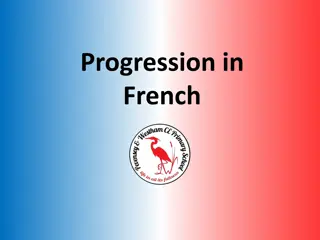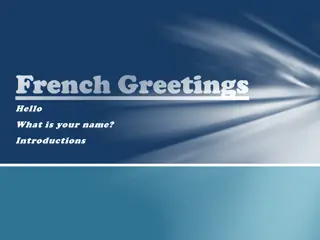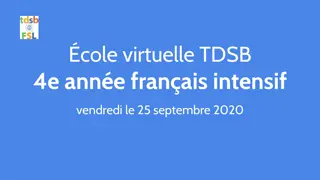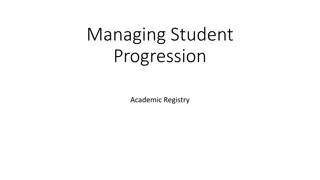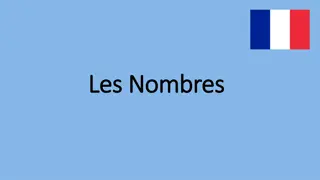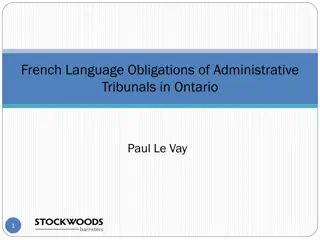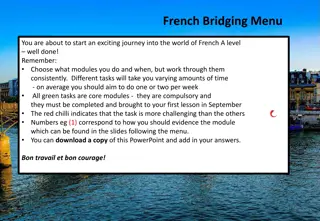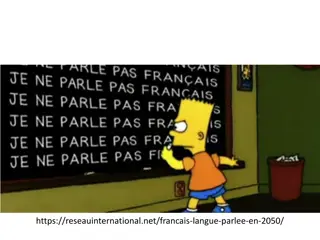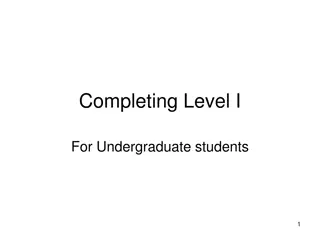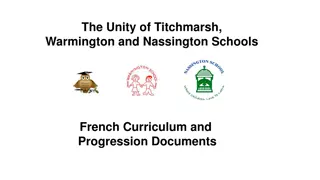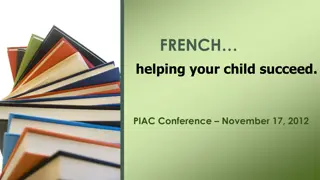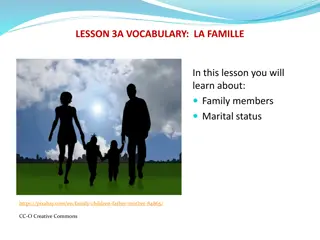French Progression Plan for Year 3 and Year 4 Students
Explore the French progression plan for Year 3 and Year 4 students focusing on greetings, numbers, colors, and basic conversations. Students will develop language skills in speaking, listening, reading, and writing, progressing from basic phrases to more complex questions and instructions. Inclusive and adaptive teaching strategies are integrated for all learners, ensuring a comprehensive language learning experience.
Download Presentation

Please find below an Image/Link to download the presentation.
The content on the website is provided AS IS for your information and personal use only. It may not be sold, licensed, or shared on other websites without obtaining consent from the author.If you encounter any issues during the download, it is possible that the publisher has removed the file from their server.
You are allowed to download the files provided on this website for personal or commercial use, subject to the condition that they are used lawfully. All files are the property of their respective owners.
The content on the website is provided AS IS for your information and personal use only. It may not be sold, licensed, or shared on other websites without obtaining consent from the author.
E N D
Presentation Transcript
Progression in French
Year 3 A new start Frenc h Summary During this half term the children will look at France as a country, and start the early stages of conversation building to include greetings, feelings and names. The children will also be introduced to numbers and colours. Language Learning skills Speak confidently (words or short phrases). Identify key sounds and silent letters in French. Ask a question with correct intonation. Try to read and understand some familiar target language in French. Try to copywrite some words or short phrases. Begin to attempt to write some words from memory. Year 3 French End Points Pupils making a good level of progress will be able to: Listening: Can understand a few familiar spoken words and phrases. Substantive Knowledge Say and write a greeting and a farewell in French. Ask and answer the question How are you? Say My name is and ask What is your name? in French. Say numbers between 0 and 10. Write some numbers between 0 and 10. Say some colours in French. Speaking: Can say/repeat a few words and short simple phrases and would be understood by a sympathetic native speaker. See examples Reading: Can recognise and read out a few familiar words and phrases. Writing Phonics Can write or copy a few simple words or symbols as an emergent writer of the language. Spotlight on SEND Inclusive and Adaptive teaching oi au revoir Pupils with SEND are supported across the curriculum through Quality First Teaching informed by Inclusive and Adaptive teaching practices. This is part of our universal offer. noir trois Subject specific inclusive and adaptive strategies can be found here. Primary Language Network Grammar Asking a question - intonation Stage 1 (Y3) Autumn 1 - Lessons 1 to 6 https://pln.myvle.co.uk/files/sc3490/websites/lsp ace_105/?page=2557&t=A+New+Start
Year 4 Welcome to school Frenc h Summary During this half term the children will revisit some of the core language they learned in Year3 (asking and answering their name, where they live, greetings, days of the week, months of the year, classroom instructions, numbers and age). The children will also be introduced to names for rooms in a school, and nouns for classroom objects. Language Learning skills Speak confidently (words, phrases, sentences). Imitate key sounds and silent letters. Memory skills to aid comprehension. Identify language patterns. Ask a question with correct intonation. Read and understand some familiar and unfamiliar target language. Try to copywrite some words or short phrases. Try to write familiar language from memory. Year 4 French End Points Pupils making a good level of progress will be able to: Listening: Can understand a range of familiar spoken phrases and is able to listen for specific words and phrases. Substantive Knowledge Ask and answer several questions about myself Recall classroom instructions Say and read some numbers between 0 and 20 Remember days of the week and months of the year Say and write names of rooms in a school Say and write nouns for some classroom objects Speaking: Can ask and answer simple questions and give basic information. Can pronounce familiar words and some new words accurately. See examples Reading: Can understand simple written phrases. Can match sounds to familiar written words. Phonics Spotlight on SEND Inclusive and Adaptive teaching Writing eau Can spell some familiar written words and phrases accurately and write simple sentences with limited mistakes so that the message is understood. ciseaux Pupils with SEND are supported across the curriculum through Quality First Teaching informed by Inclusive and Adaptive teaching practices. This is part of our universal offer. bureau Subject specific inclusive and adaptive strategies can be found here. Building on Year 3 Say and write a greeting and a farewell in French. Ask and answer the question How are you? Say My name is and ask What is your name? in French. Say numbers between 0 and 10. Primary Language Network Grammar Masculine and feminine singular nouns. Stage 2 (Y4) Autumn 1 - Lessons 1 to 6 https://pln.myvle.co.uk/files/sc3490/websites/lsp ace_105/?page=2565&t=Aut+1+- +Welcome+to+School
Year 5 Me / In the city Frenc h Summary During this half term the children will revisit some of the core language they have learned in Y3 and Y4 of language learning, and build on that to include extended feelings phrases. Language Learning skills Speak confidently (words, phrases, sentences). Recall/pronounce key sounds and silent letters. Memory skills to aid comprehension. Identify links between languages. Identify word roots across languages. Develop reading aloud skills. Develop comprehension skills. Develop speaking/writing skills. Continue to develop use of word reference tools. Practise techniques to commit new language to memory. Explore sentence structure Sound Spelling Exploration Year 5 French End Points Pupils making a good level of progress will be able to: Listening: Can understand the main points from a series of spoken sentences (including questions.) May require some repetition. Speaking: Can ask and answer simple questions on several topics and can express opinions. Can take part in brief pre-prepared tasks such as short presentations and role plays. See examples Reading: Can understand the main point(s) from a short, written passage in clear printed script. Can use bilingual dictionaries independently. Can apply phonic knowledge to find, understand and/or produce spoken and written words. Writing Can write two or three short sentences as a personal response, using reference materials / with support. Attempts to use accurately nouns and adjectives and shows awareness of the use of and conjugation of some commonly used and regular verbs in the present tense Primary Language Network Stage 3 (Y5) Autumn 1 - Lessons 1 to 3 They'll learn about Paris, explore its facts, and practice language for buying tickets and asking for directions. Substantive Knowledge Understand some adjectives to describe feelings. Answer the question How are you? in more detail. Say an extended sentence about how they are feeling. Understand some facts about the capital city of France. Ask for an entrance ticket. Give and understand some simple directions around the city. ais oo Spotlight on SEND Inclusive and Adaptive teaching anglais zoo francais Pupils with SEND are supported across the curriculum through Quality First Teaching informed by Inclusive and Adaptive teaching practices. This is part of our universal offer. Subject specific inclusive and adaptive strategies can be found here. Grammar Conjunctions and extended sentences Verbs of opinion- 1st/2nd person singular. Begin to explore: 3rd person singular and verbs Building on Year 4 Ask and answer several questions about myself Say and read some numbers between 0 and 20 Remember days of the week and months of the year https://pln.myvle.co.uk/files/sc3490/websites/lspa ce_109/?page=2551 Stage 3 (Y5) Autumn 2 - Lessons 1 to 3 https://pln.myvle.co.uk/files/sc3490/websites/lspa ce_105/?page=2572
Year 6 This is me! Frenc h Summary During this half term the children will revisit personal information question and answers, and extended feelings. They will recall how to give opinions of school subjects including reasons, and recall numbers to 60. Children will be introduced to the o clock structure in French, and key daily routine phrases in order to be able to write a sequence of daily routine phrases, and ask and answer questions about daily routine. Language Learning skills Speak confidently (short phrases to extended sentences). Listen attentively. Use a bilingual dictionary to find meanings of words. Imitate pronunciation of sounds accurately. Ask questions accurately with correct question words and intonation Practise new language with a partner. Year 6 French End Points Pupils making a good level of progress will be able to: Listening: Can understand the main points and some detail from a short, spoken passage with comprising of familiar language Speaking: Can take part in a simple conversation and can express simple opinions. Generally accurate pronunciation (to a sympathetic native speaker). Substantive Knowledge Recall phrases to talk about self and own feelings. Understand and use adjectives to talk about own personality. Recall how to describe eyes and hair colour. Read and understand a poem about personality and physical appearance. Write a poem about personality and physical appearance. Understand and sing along to a song. See examples Reading: Can understand the main points and simple opinions of a longer written passage (e.g. letter, recipe, poem, story, an account. Can use a bilingual dictionary to access unfamiliar language. Phonics eur Spotlight on SEND Inclusive and Adaptive teaching auteur Writing professeur Can write a short text attempting to use accurately nouns, adjectives and some commonly used and regular verbs in the present tense on a familiar topic using reference materials, support if necessary. Primary Language Network Pupils with SEND are supported across the curriculum through Quality First Teaching informed by Inclusive and Adaptive teaching practices. This is part of our universal offer. docteur Subject specific inclusive and adaptive strategies can be found here. Building on Year 5 Understand some adjectives to describe feelings. Answer the question How are you? in more detail. Say an extended sentence about how they are Grammar Time phrases- o clock Present tense 1st/2nd person singular questions and answers with some daily routine verbs. Stage 4 (Y6) Autumn 1 - Lessons 1 to 6 https://pln.myvle.co.uk/files/sc3490/websites/lspa ce_109/?page=2564
French Inclusive and Adaptive Teaching Strategies Frenc h In addition to the generic inclusive and adaptive teaching strategies at PaWS, in French, teachers consider the following: Embed opportunities for over-learning, repetition and application into every lesson as learning a new language places huge demand on working memory. Provide vocabulary lists for each unit of work which learners can refer to. Use a little and often approach to introducing new vocabulary and vocabulary retrieval. Use of targeted questions to check understanding, eg of more complex vocabulary or terms with more than one meaning. Incorporate group and pair speaking tasks to support learners in feeling more comfortable speaking. Use game-orientated speaking tasks, to help learners forget their anxiety and focus attention. Focus on the essential and be selective to support learners to develop conceptual understanding.


